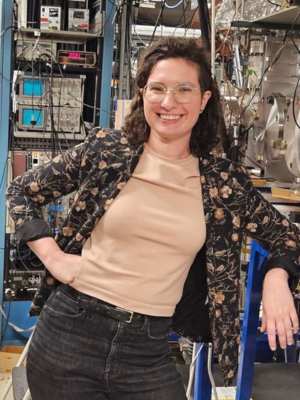Meet Eleanor Castracane
 Tell us a bit about yourself: I grew up in Queens, New York. I attended Stony Brook University on Long Island, where I received a combined B.S./M.S. degree in Chemistry. While there, I developed an experimental model for the gas-phase synthesis of atmospherically relevant sulfuric acid/amine aerosol clusters. I graduated from UC San Diego with a Ph.D in Chemistry in May 2024. I am currently a postdoctoral research associate through the National Research Council, where I am developing new techniques to remediate PFAS from water and soil.
Tell us a bit about yourself: I grew up in Queens, New York. I attended Stony Brook University on Long Island, where I received a combined B.S./M.S. degree in Chemistry. While there, I developed an experimental model for the gas-phase synthesis of atmospherically relevant sulfuric acid/amine aerosol clusters. I graduated from UC San Diego with a Ph.D in Chemistry in May 2024. I am currently a postdoctoral research associate through the National Research Council, where I am developing new techniques to remediate PFAS from water and soil.
What are you studying/researching? I was a member of the Continetti Group in the Department of Chemistry & Biochemistry. My dissertation involved photodissociation and dissociative photodetachment dynamics studies of small, atmospherically relevant carboxylic acid anions. I used ultraviolet lasers to remove electrons from anions and studied how the resulting neutral molecule falls apart. From this, we can learn about the energetics of molecular dissociations and the different accessible electronic states of the molecules.
Describe your involvement in the UC San Diego community: I was a Teaching Assistant for CHEM 7L (General Chemistry Lab) and CHEM 100A (Analytical Lab), the latter for which I helped reform some experiments in the curriculum. I was a cohort representative for our Chemistry Graduate Student Council for multiple years. Through CGSC, I founded the Mental Health Support Group, which met once a month for two years to discuss graduate student mental health, share experiences and coping mechanisms, and support each other through our trials and tribulations in graduate school. During the pandemic, I served as the Recording Secretary for our UC Student-Workers Union, where I organized around the Cost of Living Adjustment (COLA) campaign as well as bargained COVID-related effects to our contracts. I also completed the American Sign Language sequence of classes and attended ASL Club meetings.
Why UC San Diego? I thoroughly enjoyed my master’s research and wanted to continue studying gas-phase ions and developing novel instrumental techniques, so I came here to work under my M.S. advisor's Ph.D. advisor! The lack of snow is also a huge plus. I'm so grateful for the support system I've formed here. Knowing that there are students, faculty, and staff who have my back has definitely facilitated my graduate school experience.